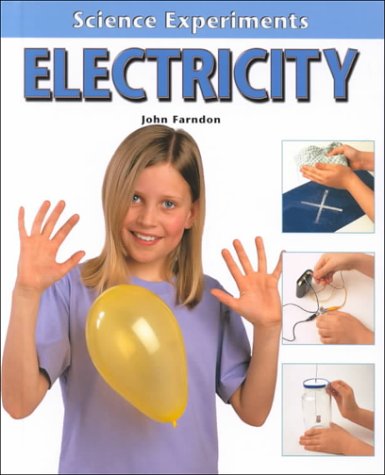-
Basic Electricity
Antony Hall
language (, Oct. 24, 2019)This ebook brings everything about the world of electricity to its basic concepts and functionalities.
-
Electricity
Andrew Haslam
Paperback (Cooper Square Publishing Llc, May 1, 2000)A unique blend of imaginative activities, experiments, and science facts helps develop scientific thought. This mix of hobby and science teaches kids to observe, collate information, and reach conclusions. Teaches scientific principles through the hands-on process of making science work. An invaluable science series for school and home. Y
Y
-
Electricity
Georgia Amson-Bradshaw
Library Binding (PowerKids Press, July 15, 2019)Electricity can seem like a mysterious force. We often don't even think about it, until the power goes off. This valuable volume allows young scientists to explore the energy we call electricity and understand how humans have harnessed it to power our homes and devices today. Essential information is explained in an accessible and entertaining comic-book design. Beneficial diagrams further enable readers to comprehend key concepts and quiz questions allow for self-assessment. S
S
-
Electricity
Peter D. Riley
Paperback (Franklin Watts, March 1, 1999)Explains the main scientific principles of electricity and presents experiments to show how it works S
S
-
Electricity
Becky Olien, Rebecca Jean Olien
Library Binding (Capstone Press, Sept. 1, 2002)Provides an introduction to electricity, along with information on how electricity is created, stored, and moved. Includes an activity and information on Benjamin Franklin. P
P
-
Electricity
Mari Schuh
Paperback (Childrens Pr, March 1, 2011)Introduces electricity through real-world observation and simple scientific diagrams. K
K
-
Electricity
Louise Spilsbury, Richard Spilsbury
Paperback (Raintree, Aug. 1, 2017)Who first discovered static and why was this important? What is an LED? This fascinating book looks at the historical controversies that surround the discovery and theories of electricity and tells the stories of the scientists who worked on them. It also examines how the different theories based on electricity were arrived at, how they were tested, and what impact these theories and discoveries have had on our understanding of science today. Y
Y
-
Electricity
Louise Spilsbury
eBook (Oxford University Press, Feb. 5, 2015)Read and discover all about electricity. What machines use electricity? What is a battery? Read and discover more about the world! This series of non-fiction readers provides interesting and educational content, with activities and project work. Y
Y
-
Electricity
John Farndon
Library Binding (Benchmark Books, Dec. 1, 2000)Explains what electricity is, what it does, and shows step-by-step how to perform experiments using static electricity, currents, conductors and insulators. Y
Y
-
Electricity
Ian F Mahaney
Paperback (Rosen Classroom, Jan. 1, 2007)Explains the different types of electricity and how electricity is made, and provides step-by-step instructions for creating a windmill. Y
Y
-
Electricity
Samantha Berger, Pamela Chanko
Paperback (Scholastic, Jan. 1, 1999)Simple text and photographs present the effects of electricity on our lives by contrasting various tasks as they are done with and without electric power.
-
Electricity
Rebecca Pettiford
Library Binding (Bellwether Media, Aug. 1, 2018)Electricity powers light bulbs, televisions, refrigerators even cars! Teeny-tiny electrons keep our big world running. In this title, early readers will explore the science behind electric currents, conductors, insulators, static electricity, and more. Narrative openings surround readers with the science around them. Photo labels visually define glossary terms and other important words. Infographics offer additional insight into concepts that are tough to grasp. Simple experiments help the readers test the topic on their own. J
J